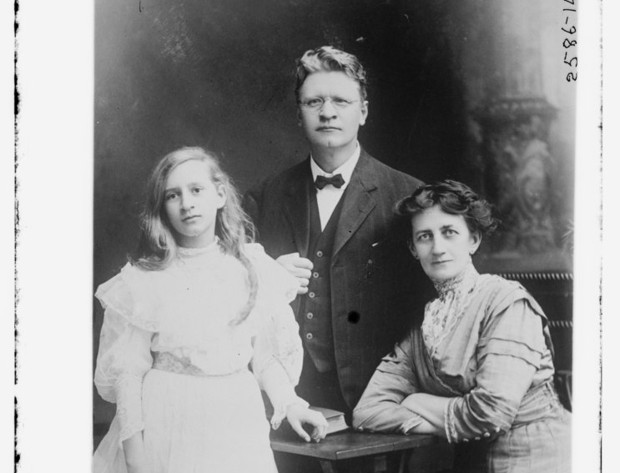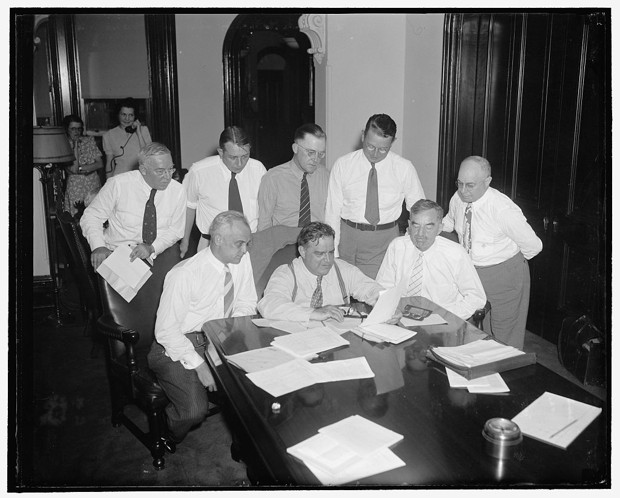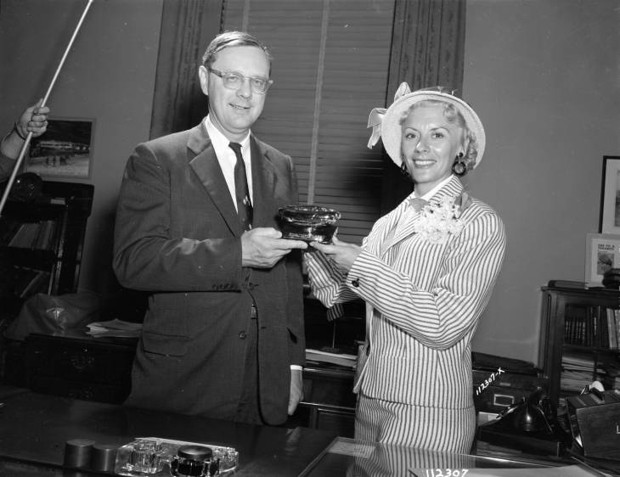The city stands apart for electing three socialist mayors, but their work on infrastructure, parks, and housing looks much like what’s expected of mayors today.
To hear Alice Cooper describe it in Wayne’s World, one of the most interesting things about Milwaukee is that it’s the largest American city to ever elect three socialist mayors.
That fact made the rounds again this week when the Democratic Party chose Milwaukee to host the 2020 Democratic National Convention. Many pundits, especially on the right, were quick to say the DNC selection site reflects a more recent embrace of socialism by some of its members. But as Charles Sykes, author of the book How the Right Lost Its Mind, explains in The Atlantic, Milwaukee’s socialist mayors—who served between 1910 and 1960—weren’t cult icons like Alexandria Ocasio-Cortez or Bernie Sanders. In fact, their policies seem downright conventional when compared to what’s expected of mayors today.
Local political opponents dubbed these mayors “sewer socialists,” a term that was soon embraced by them and their supporters. “Some Eastern smarties called ours a ‘Sewer Socialism,’ wrote Emil Seidel, the first of the mayors, in office from 1910 to 1912. ”Yes, we wanted sewers in the workers’ homes; but we wanted much, oh, so very much more than sewers.” He and his successors, Daniel W. Hoan (1916–40) and Frank Zeidler (1948–60), sought to clean the city—both literally and metaphorically—tackling corruption while improving public works system and public health.
Sewer socialism was largely borne out of Milwaukee’s rapid industrialization in the late 19th century. Like so many other industrial cities, economic growth came at the expense of workers and the environment. In the 1880s, strikes and lockouts over long hours and low wages—some earned as little as $1.25 per 10-hour day, six days a week—shut down the city and led to bloody massacres at the hands of the local militia. Companies went bankrupt or moved, leaving behind factories, scrap yards, and junk piles. Streets were filthy and the Menomonee River was so polluted it became known as the river of death.
Not to mention, corruption in city government at the time was comparable to Chicago’s, with nearly 300 indictments against city officials during Mayor David Rose’s term, which ended in 1910. By 1900, Milwaukee was ripe for change, and thus began the city’s socialist era. So who were these so-called sewer socialists?

Seidel, who won the 1910 mayor’s race by a landslide, perhaps spelled out the platform most clearly in his memoir:
We wanted our workers to have pure air, we wanted them to have sunshine, we wanted planned homes, we wanted living wages; we wanted recreation for young and old; we wanted vocational education; we wanted a chance for every human being to be strong and live a life of happiness.
And, we wanted everything that was necessary to give them that: playgrounds, parks, lakes, beaches, clean creeks and rivers, swimming and wading pools, social centers, reading rooms, clean fun, music dance song and joy for all.
He served only one term, and ran as the Socialist Party’s vice presidential nominee alongside Eugene Debs in 1912. As mayor, Seidel devoted his two years to improving the lives of workers and transforming the corrupt government into an efficient one. Alongside nearly 40 other socialists in Milwaukee’s city council and county board, he established the city’s first department of public works, as well as its fire and police commissions and a city parks system. (In fact, Milwaukee has one of the nation’s best collection of public parks, thanks in part to Seidel’s city treasurer and “godfather of county parks,” Charlie Whitnall, who was an impassioned advocate for green space.) Seidel also raised the minimum wage for city workers from $1.75 to $2.00 per day while successfully fighting alongside Victor Berger—the first socialist elected to the House of Representatives—for the eight-hour workday.
In his 1947 obituary, the Milwaukee Journal summed up Seidel’s vision: “Emil Seidel wanted to make the city a great experiment in Socialism. … and all his actions were unvaryingly directed toward that end.”

As the archivist Edward Benoit III writes in his thesis on Milwaukee’s socialist movement, Hoan was perhaps the most pragmatic of the three mayors, breaking from the national socialist party to focus on the needs of city residents. That allowed him to serve 24 years as mayor despite the decline of socialism across U.S.
Under Hoan’s most “radical” policies—which, as Sykes writes in his article, are hardly extreme by today’s standards—he established Milwaukee’s first public housing and bus systems. Embracing the “sewer” in sewer socialism, he also secured the municipal takeover of both the waste disposal and water filtration systems. Milwaukee built its first treatment plant in 1934, seeking to use access to clean water to expand the city.
They weren’t all success stories: Nearby suburbs fought hard against Hoan’s expansion tactics, eventually building their own water filtration systems. And within the city, budget constraints meant that Milwaukee’s first public housing project, the Garden Homes, established in 1923 on 19 acres of farmland outside the city, only had 105 residences—and 700 applicants. The population had grown by 79,000 people between the end of Seidel’s term and the beginning of Hoan’s. The housing stock in that time increased by only 6,000, and there was a shortage of 7,000 homes, according to the National Park Service.
Hoan prioritized families with less than $1,500 in savings, but occupants soon learned they would also have to pay for sewage and street improvements after Milwaukee annexed the area into city limits. Eventually, a state law would allow what was supposed to be affordable housing to be sold for private profit.
Hoan’s idea still caught national attention and is today one of the earliest examples of public housing. And even with the various setbacks, a 1940 Time magazine article credited Hoan for making Milwaukee one of the the “best run cities in the U.S.”

As Milwaukee historian John Gurda explained in a 2017 presentation at the Zeidler Center for Public Discussion, the three-term mayor followed the “cooperative commonwealth” of the socialist philosophy. “It resonated with him that socialists believed in solving problems by cooperation instead of competition, by collaboration rather than conflict,” Gurda said.
By the time Zeidler became mayor in 1948, Milwaukee was racing to keep up with downtown development across U.S. cities. Urban renewal—the need to eliminate blight—and expansion thus dominated much of his policy agenda. Under his leadership, the city started developing a freeway system, something that the public at the time believed was crucial to surviving the 20th century.
His legacy, though, was the growth of the city and its economic development potential. “His major, and best known, and I would argue longest lived physical capital initiative was a program of annexation,” Gurda said “Milwaukee’s land area practically doubled from roughly 50 square miles to 100 square miles.”
All the while, Zeidler tried to follow through with a no-debt campaign platform, though as Radio Milwaukee pointed out, he did end up borrowing $55 million from the federal government for such capital projects. And despite his progressive agenda, the continual lack of affordable housing and the rise of discrimination as Milwaukee’s black population grew belied Zeidler’s urban renewal efforts.
Nonetheless, there was an “unmistakeable moral tone” in his policy, according to Gurda, who read one of Zeidler’s popular quotes: “We participate in local government in order that, by our participation, there may emerge nobler beings with enlarged concepts of liberty, truth, justice, cooperation, peace, and righteousness."